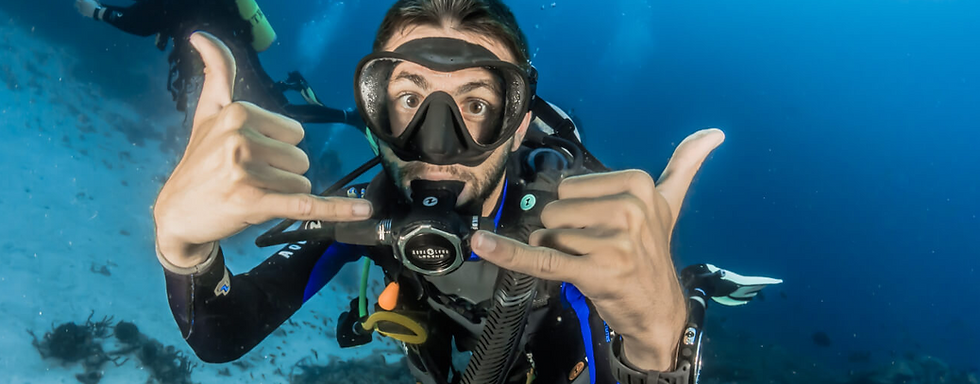What Every Diver Should Know: Scuba Dive with Confidence and Finesse
- Samuel & Kent

- Oct 28, 2023
- 4 min read

Scuba diving is an immensely enjoyable avocation that combines adventure, knowledge, skills, and self-discipline. Humans were not meant to spend much time underwater, but thanks to technology, we are able to enjoy the mysteries of the last frontier on this planet. SCUBA has a great safety record, but it is still an inherently dangerous sport. Without the proper knowledge, skill development, and practice, a diver can make poor decisions, and the consequences can be extreme.
How do we SCUBA dive safely? How do we do it gracefully and with style? Can we observe the delicate reef systems without destroying them in the process? The answers lie in the quality of the training and education provided to the new student, and the ability to practice and rehearse for the certified diver.
A Scuba Diving Certification Card is not the goal. Becoming a skilled, knowledgeable, responsible, and self-sufficient diver is the goal. Achieving the C-Card is a reward for the experience. There are basic fundamentals that should be taught to new divers over and above the agency-required survival skill set.
What Every Diver Should Know:
1. Understanding Dynamic Physics and Pressure Effects:
Every diver should delve into the dynamic physics that governs underwater exploration. Concepts like buoyancy, density, and the profound impact of pressure on the diver and equipment are crucial. Boyle's Law, explaining the behavior of gases under pressure, is a cornerstone for safer and more controlled dives. A thorough understanding of these principles ensures a harmonious interaction with the underwater world
Recommendations
* Attend specialized workshops on buoyancy control and the physics of diving
* Engage in practical applications during dives, experimenting with buoyancy in controlled environments
Long-Term Benefits
* Enhanced safety through informed decision-making
* Improved confidence leading to a more enjoyable diving experience
2. Comprehending Pressure and Human Physiology:
Beyond the equipment, divers should grasp the effects of pressure on human physiology. Gas narcosis and decompression sickness are potential risks that every diver should be aware of. Maintaining a constant awareness of one's physical condition and recognizing signs of distress is paramount. In-depth knowledge empowers divers to make informed decisions for their safety and well-being
Recommendations
* Participate in medical-focused diving courses
* Regularly review physiological aspects through reputable diving literature and online resources
Long-Term Benefits
* Reduced risk of physiological issues, contributing to overall diver well-being
* Ability to make informed decisions in complex diving scenarios
3. Adapting to Changing Environments:
The underwater environment is dynamic and subject to rapid changes in weather, currents, and visibility. Every diver should hone the skill of adaptability. Planning for potential changes and having the ability to adjust to unexpected circumstances are essential. This adaptability not only enhances safety but also enriches the overall diving experience
Recommendations
* Join local diving clubs to learn from experienced divers familiar with regional conditions
* Participate in simulated dive scenarios to practice adaptability
Long-Term Benefits
* Increased safety through effective responses to unforeseen changes
* Enhanced enjoyment as divers confidently explore diverse underwater environments
4. Mastering SCUBA Equipment:
Divers should go beyond a basic understanding of equipment. Each diver should delve into the design, purpose, and functions of specialized SCUBA gear. Regular maintenance is crucial, and divers should be adept at troubleshooting common issues underwater. Mastery of equipment not only ensures safety but also contributes to a smoother and more enjoyable dive.
Recommendations
* Undertake equipment-specific workshops offered by diving equipment manufacturers
* Regularly practice gear maintenance and troubleshooting in controlled environments
Long-Term Benefits
* Increased self-sufficiency and confidence in handling equipment issues
* Improved gear longevity through proper maintenance
5. Planning Safe and Realistic Dives:
Dive planning is an art that every diver should master. Selecting dive sites wisely, considering depth, and adhering to buddy team protocols are key components. Contingency planning and familiarity with emergency procedures provide a safety net. By planning safe and realistic dives, divers can maximize their time underwater while minimizing risks.
Recommendations
* Attend advanced dive planning courses
* Utilize dive planning software and apps for detailed preparation
Long-Term Benefits
* Reduced risk of accidents through meticulous planning
* Cultivation of a safety-first mindset, contributing to a positive diving culture
6. Developing Buoyancy Control and Propulsion Skills:
The underwater world is delicate, and every diver should contribute to its preservation. Buoyancy control is a foundational skill that minimizes the impact on the environment. Developing proper trim, maintaining a streamlined profile, and mastering various kicks for propulsion and control contribute to responsible and eco-friendly diving. Buoyancy control not only conserves energy but allows divers to move through the water with grace and precision.
Recommendations
* Take specialized buoyancy control courses
* Engage in regular buoyancy-focused practice dives
Long-Term Benefits
* Minimized impact on fragile underwater ecosystems through precise buoyancy control
* Improved air consumption, extending dive times, and reducing environmental impact
Embodying Excellence:
In embodying these six principles, divers not only ensure their safety but also become stewards of the underwater world. Beyond the thrill of the dive lies a commitment to excellence, responsibility, and a deep respect for the awe-inspiring ecosystems we encounter as divers. Every diver should aspire not just to explore the depths but to do so with confidence, finesse, and a profound understanding of the underwater realm. It's not just about the act of diving; it's about embodying a commitment to excellence, responsibility, and a profound respect for the awe-inspiring world of scuba diving. Safe and enjoyable diving awaits those who take the time to master these essential skills and principles.






Comments